Buzzfeed is the future of activism, so get those .gifs ready.
We’ve all fallen down the Buzzfeed rabbithole once or twice or 17 times a week. It’s OK to admit it, especially now that Buzzfeed came out on its Tumblr and admitted it “unequivocally” supports feminism. YAY! 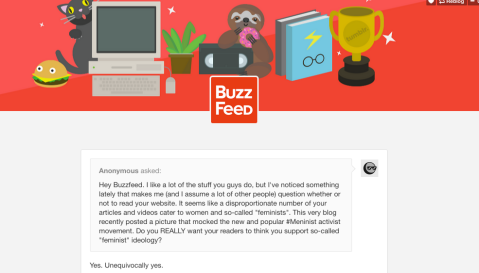
While it’s AWESOME to hear Buzzfeed say it out loud, it should come as no surprise that Buzzfeed is a bunch of feminists just like you and me. They’ve published numerous peaces on the body peace movement, called attention to the hilarity of women’s lingerie, highlighted everyday feminist struggles as well as how feminism helps everyone and publicized feminist moments and clips of celebrity feminists declaring their support for gender equality in a positive light.
Not to mention that Buzzfeed has done a fantastic job of being inclusive of all issues surrounding gender and racial equality; highlighting subjects from hijabs to Ferguson. They’ve covered LGBT issues extensively, maintained a sex positive attitude, and talked extensively about kickass women in the media, art, music, politics, television, and books – and covered them well. They’ve also made huge moves to ensure diversity in their hiring and therefore in their staff.
In short – Buzzfeed is a feminist, liberal, intersectional powerhouse and they’re going going to get more powerful. Feminist and liberal organizations aren’t ignoring that fact – organizations like Planned Parenthood, the American Civil Liberties Union, the National Women’s Law Center*, and NARAL Pro-Choice America* all have active Buzzfeed accounts. Buzzfeed’s audience is the future generation of feminists and social justice activists. From here on out, we’ll be seeing a lot more .gifsets.
Full disclosure: I work at NARAL Pro-Choice America and am a former employee of the National Women’s Law Center.
Subway thinks the only way you can wear Halloween costumes is if you’re a size 0
I mean, REALLY Subway? In the ad, she food-shames her co-workers (who apparently only eat burgers when they aren’t going to wear swimsuits, which is the stupidest thing I’ve ever heard) and tells them that it’s “Halloween Costume Season” – and in order to be an attractive person in a costume, you must be thin. EXCUSE ME? I mean, first off, all her costume ideas are *yawn* so uninspired. You can do better. Why not dress as a Subway sandwich? A SEXY subway sandwich. No cheese, ’cause that’s fattening. But overall, this is all such BS. As if women needed more reasons and “seasons” we needed to diet in. I look at my health as a holistic part of who I am – and who I am is someone who, yes, loves pizza, oreos, and has a candy stash she dips into just a teeny bit every day at her desk. But I also love fresh summer salads, and running, and greek yogurt. It evens out. So let’s all just stop stressing out about seasons and costumes and clothes please. We’re gorgeous at exactly the size we are right now, and my halloween costume will be kickin’ no matter what size my waist is.
I have a flaw in my feminism. I’m working on it.
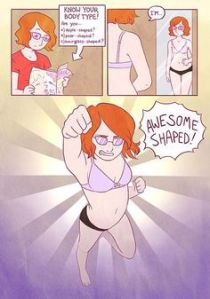 I’ve been making my way through Roxane Gay’s AMAZING book Bad Feminist, which you should go out and read ASAP. As Gay talks about her own experiences, the flaws in our looks-obsessed and patriarchal society, I’ve been trying to come to terms with my own biggest flaw as a feminist.
I’ve been making my way through Roxane Gay’s AMAZING book Bad Feminist, which you should go out and read ASAP. As Gay talks about her own experiences, the flaws in our looks-obsessed and patriarchal society, I’ve been trying to come to terms with my own biggest flaw as a feminist.
After struggling with my weight for my whole adolescence (and, let’s be real, still struggling a little – my relationship with my physical form will always be at least a minor battle), then losing quite a lot of weight through calorie counting and Jillian Michaels tapes; which leave you with some CRAZY messed up ideas about beauty, then realizing what a toll those standards were taking on my mental health and outlook on the world and other women on my life … I FINALLY (with a LOT of effort) reached some version of body acceptance. This battle, though, has left my staunchly, unapologetically feminist self with one little blip.
I have ingrained VERY deep in me the weight loss culture and traditional societal expectations of what “healthy” is and how to be desireable. They’re bullshit. I’m fully aware of it.
And yet.
And yet I occasionally make “she’s so skinny you’d never think she eats a donut!” jokes – they’re nervous ticks, really, at this point. Empty words I say in conversation that I know don’t add anything, things I don’t really believe in. I know size is no way to judge a person’s diet, fitness, or health. I know that perfectly healthy people eat donuts.
I do these things WAY less than I did when I first started successfully losing weight; far less than I did when I finally started getting help to bring myself out of my messed up body image crap and accept and love my natural body type that came when I exercised regularly and ate a balanced diet. They come up once every few months. But when I say these things, they bother me for WEEKS.
I don’t believe them. So why do I say them?
I’ve already decided that every time I make one of these comments, I’m going to give $5 to SPARK. They do amazing things to promote healthy body image and healthy sexuality. But I call attention to my flaw because I think that everyone can relate to it. One of the biggest hurdles to self-love is how ingrained these ideas are in us. I don’t have an answer of how to fix them – but at the bare minimum, we all need to be more aware of them, call out media which uses them, and tell them: we are not. buying it.
All I know is that I care about this problem, and I want to make it better.
Emma Watson gave an amazing speech on feminism, gender equality around the globe, and the need for men to rise up and speak out this weekend at the U.N.
If you haven’t watched it yet (and you should, because it is amazing):
This speech is so perfect, I barely know where to begin. She discusses the fact that feminism is NOT about hating men, but is instead about creating a world where your worth is not determined by your gender. She talks about the stigmas that stop so few from remaining open to feminism and how it could help them. She hits the way gender stereotypes hurt not only women, but men as well. The fact that inequality is a GLOBAL problem – no country can say it is truly one where women and men are equal. That sometimes, caring passionately about an issue, speaking up; and then working to make it better is truly the most important thing we can do.
But most importantly, in my eyes, is the fact that she uses her speech as a call to arms for men to get involved in the cause. Gender inequality hurts us all. While women see the harshest results of a patriarchal society, men see them too. When any group is unequal, society is unequal. Period. When we fight together for equality, we all win.
Emma Watson gets that.
The Problem with Walking Out
On March 27th, Former Vice President Dick Cheney came to my alma mater, American University, to discuss Russia, Iran, gay rights, and his life in politics. Sure, an interesting choice for the Kennedy Political Union, and for AU in general, but still makes perfect sense – after all, American is often ranked as the number one politically active school in the nation, and is based on Washington, D.C., and is home to a student body remarkably impassioned, inspired, and interested in politics.
Which is why I was so incredibly disappointed to hear about what happened on Thursday.
As I had expected, a number of students gathered outside of Bender Arena, where Cheney was speaking, holding protest signs and really epic protest attire (Seriously, I didn’t even know they still made “Dick Cheney in prison uniform” costumes anymore. Kudos, AU student body).
This protest was the American University students that makes me proud to be an alumni – they respectfully obeyed the rules, kept their signs and protest outside the event; in a way that was respectful of the rules, the event, and still got their point across.
Then I saw this video, of American University students screaming during Dick Cheney’s speech, and walking out:
And then I was disappointed. My time at American taught me to keep an open mind, hear the other side, be an informed, knowledgeable member of society. What these students did was the opposite. While I’m sure I wouldn’t have agreed with many of the things Vice President Cheney said, I would have either protested outside or sat in on the discussion, politely listened, come up with a few questions to ask at the microphone at the end of the speech, taken a moment to consider his point of view, and channeled my outrage and frustration into activism on an issue, volunteering, or even just plain old writing a blog. The answer to an open discourse and solving our country’s problems isn’t angrily screaming and walking out – it’s asking informed questions and taking action.
Feminist Friday Fun: Kids Pose as Iconic Figures in Women’s History
Enrique Jones has expanded his “Because of Them, We Can…” series to Women’s History Month, and the results are wonderful.
A few highlights:





Hey, Jezebel? Lose the judgement.
Last week, I wrote an article on Policy Mic about the selfie as a tool of self-confidence. As someone who has struggled greatly with weight, body image, and self confidence, I use the selfie for my own self-empowerment. Slate published a great article earlier today about selfies being “tiny bursts of pride” for girls, which, while that isn’t quite the way I’d phrase it, I agree wholeheartedly.
Jezebel responded with an incredibly judgemental, hypocritical, and rude response. An excerpt:
But the typical selfie is not taken by women who have just completed Iron Man Triathlons or finally finished reading Infinite Jest (caption: Me N DFW 4 eva! XOXO #blessed #reading #smart #rip); selfies don’t typically contain job offer letters, successful grant applications, their face in front of a gorgeously rendered still life the woman drew by hand. They’re literally just pictures of a woman’s face not talking (grey-area exception: selfies where a person’s face is not the point of the picture. Some women I follow on Instagram, for example, post pictures of themselves wearing cool sunglasses or lipstick or hats, which I feel is not technically a selfie because the point of a pure selfie is “HERE’S MY FACE” and not “here’s a cool hat/lipstick shade/pair of sunglasses”).
Further, self-taken digital portraits are typically posted on social media, ostensibly with the intent of getting people to respond to them — that’s what social media is. In that respect, selfies aren’t expressions of pride, but rather calls for affirmation. In real life, walking up to a stranger, tilting your head downward at a 45-degree angle, duckfacing, pushing your tits together, and screaming “DO YOU THINK I’M PRETTY!” would be summon the authorities. On the internet, it’s just how people operate.
Wow. Uncalled for.
Yes – I will concede that we live in a society where girls feel they need validation from others to feel beautiful and therefore worthy. There are a number of things wrong with that. Which is why I praised the idea in my piece of a selfie forum that is designed only for positive feedback, instead of people writing ugly, hateful things. The messages we receive about our physical appearance should be encouraging ones that make us feel good.
However, I don’t really think a selfie is necessarily a reflection of that. It makes me feel good, take ownership of myself and what I look like. Yes – often I’m showing off my cute hairdo, or new earrings, or funny shirt. I’m not always wearing makeup, or doing a duckface, and I don’t think I’ve ever “pushed my tits together”. Sometimes I take a selfie, but most of the time I’m thinking about the things I need to do at work, the conversation I had with my mother, the interesting article I just read. Selfies are vain sometimes. Humans are vain sometimes. Get over it.
There is a huge amount of judgement being thrown out in this piece on how people choose to express themselves. Everyone has a different style. That shirt that you find wonderful at Target may not call out to me. Those boots are screaming my name, but you couldn’t care less – you’re over by the heels. Because that is your style. That is who you are. And how you dress or how you look externally has NO reflection on the content of your character. Why are only some selfies acceptable and others aren’t? How do YOU know that I’m not taking a selfie after I finished my first 5K with the book I just finished? (Both of which I have actually done.)
I can be a feminist, advocate for women’s equality and inner worth, and still care about the way I present myself. Caring at least a little about how I look to the rest of the world is not a bad thing.
#selfie #nomakeup #feministselfie
ICYMI: Super Awesome Illustrations of Pop Culture’s Best Female Characters as Saints
They also just so happen to be some of my favorite people ever to grace my screen. (via Spencer Stalberg (artist) and Flavorwire)
Order Prints! (I want to order a mini version of all of them and create some weird shrine in my apartment)
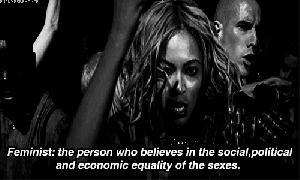
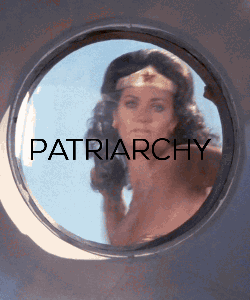
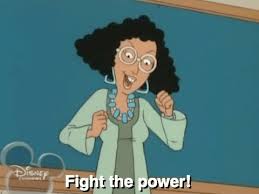




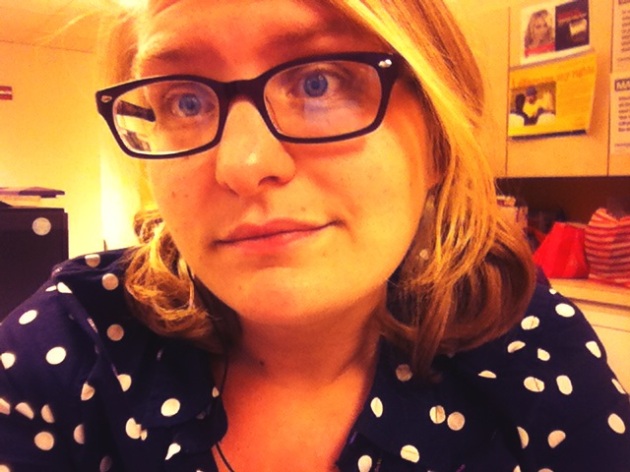
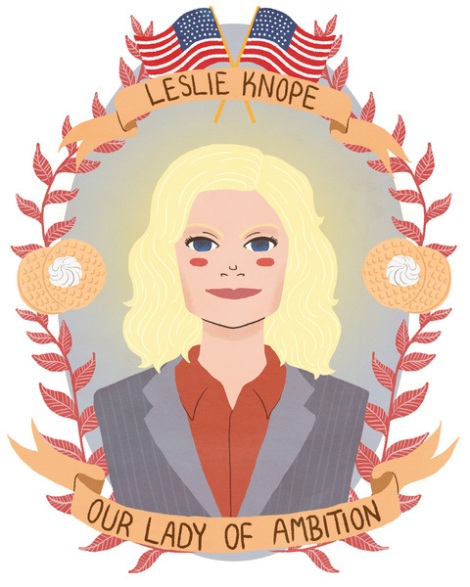
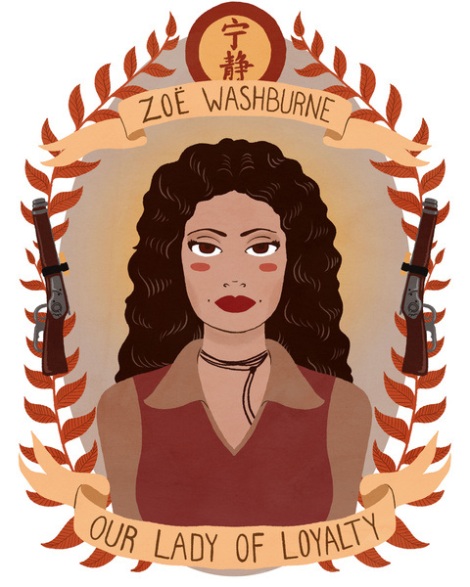




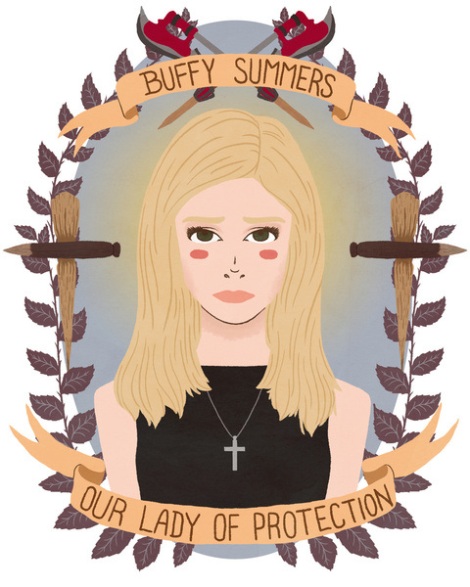
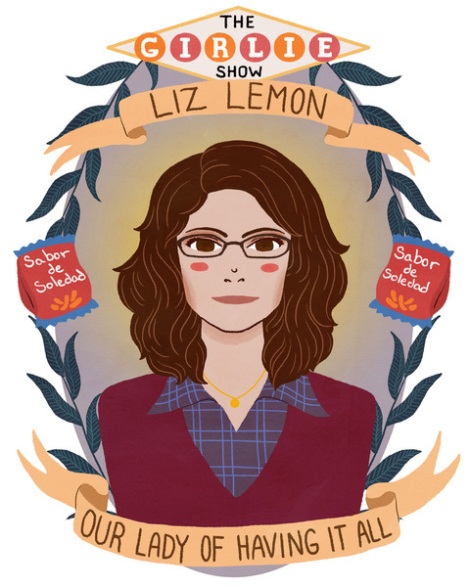
 Visit the Feminist TV Club at it's spankin' new very-own blog
Visit the Feminist TV Club at it's spankin' new very-own blog 